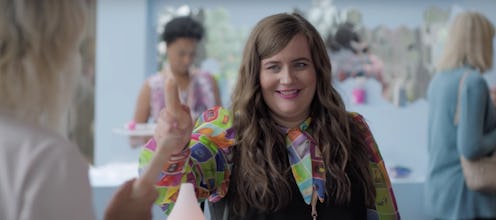Entertainment
'Shrill' Confronts The Complexities Of Corporate Feminism In A Goop-Inspired Episode

When Annie (Aidy Bryant) first enters the hallowed halls of the fictional Women Are Having a Moment conference (WAHAM) on Shrill, she weaves her way through a series of pastel booths manned by eager entrepreneurs with an expression of wonder on her face. All of them are peddling different versions of the same enticing pitch: this product will help you be the best version of yourself. Whether you achieve that with the help of a Pepto-Bismol pink gun or a deluxe crystal dildo is up to you. It's an unabashedly capitalist expression of female empowerment, and Season 2 of Shrill uses WAHAM to hold up a lens to this phenomenon and examine it from every angle.
Of course, the more time Annie spends soaking up the WAHAM ethos, the more obvious its flaws become. And they are pretty obvious: The "leg makeup" booth has before and after photos of women who covered up their "disgusting leg skin." The conference only carries shirts up to a size medium, and the price of admission to this supposedly inclusive event is a whopping $300. WAHAM may be marketed as a feminist utopia, but talking about empowerment and making it accessible and intersectional are two different things. Then there are the issues inherent in suggesting self-love can be commodified.
"If someone is trying to sell you something, it is not feminist," says Sudi Green, the writer behind the episode. Inspired by creator Lindy West's experiences at the infamous Goop conference, the writers room borrowed language from the millennial-focused networking service Girlboss, body positivity marketing campaigns (think Aerie and Dove), and the feminist "Break the Glass Ceiling!" branding that we see on billboards and tote bags today to imbue the borderline outlandish conference with a vein of truth.
"So much of what I am being marketed is products to change myself," Green says. "[Companies] are still selling you weight loss, but now it is [called] wellness.”
While it's trendy to proclaim you're a feminist on T-shirts and key chains, it's less so to investigate the way this brand of feminism excludes and alienates so many women. The episode cleverly comments on the problems that a lot of corporate feminist spaces are facing, from the blatant lack of intersectional diversity to the expensive initiation costs to participate at all.
"So often the word 'empowerment' is tied to money," Green says. "A lot of self-care is completely tied to luxury items or luxury treatments, and that lifestyle is representative of a very small part of the country." Though the episode's focus is on pointing out the pitfalls of corporate feminism, Green also wanted to emphasize that conferences like the fictional WAHAM can still be valuable to many people. A scene in which Annie meets a group of women in the bathroom and learns that they have found a real community and opportunities they wouldn't have otherwise been exposed to at WAHAM is a highlight.
"For somebody who doesn't live in a city or who wasn't in our writers' room, that message of empowerment is an important message to hear," Green says. "It is not so much about the organization; it is about what people are getting out of it, and if what people are getting out of Girlboss is life-changing, then you can't deny that that has had a positive effect on that person."
It's because of these women that Annie cannot simply write a hit piece and move on. WAHAM might be monetizing feminism, but there's still something quietly revolutionary about spaces that bring women together and allow them to speak about their experiences openly. Shrill's resistance to reducing WAHAM to a black-and-white depiction of corporate feminist culture speaks volumes, too.
This article was originally published on